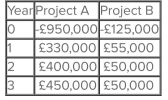Exam 6: Net Present Value and Other Investment Rules
Exam 1: Introduction to Corporate Finance50 Questions
Exam 2: Corporate Governance24 Questions
Exam 3: Financial Statement Analysis86 Questions
Exam 4: Discounted Cash Flow Valuation128 Questions
Exam 5: Bond, Equity and Firm Valuation107 Questions
Exam 6: Net Present Value and Other Investment Rules110 Questions
Exam 7: Making Capital Investment Decisions83 Questions
Exam 8: Risk Analysis, Real Options and Capital Budgeting81 Questions
Exam 9: Risk and Return: Lessons From Market History57 Questions
Exam 10: Risk and Return: the Capital Asset Pricing Model118 Questions
Exam 11: Factor Models and the Arbitrage Pricing Theory48 Questions
Exam 12: Risk, Cost of Capital and Capital Budgeting48 Questions
Exam 13: Efficient Capital Markets and Behavioural Finance49 Questions
Exam 14: Long-Term Financing: an Introduction37 Questions
Exam 15: Capital Structure: Basic Concepts80 Questions
Exam 16: Capital Structure: Limits to the Use of Debt66 Questions
Exam 17: Valuation and Capital Budgeting for the Levered Firm56 Questions
Exam 18: Dividends and Other Payouts80 Questions
Exam 19: Equity Financing66 Questions
Exam 20: Debt Financing57 Questions
Exam 21: Leasing41 Questions
Exam 22: Options and Corporate Finance86 Questions
Exam 23: Options and Corporate Finance: Extensions and Applications42 Questions
Exam 24: Warrants and Convertibles50 Questions
Exam 25: Financial Risk Management With Derivatives68 Questions
Exam 26: Short-Term Finance and Planning116 Questions
Exam 27: Short-Term Capital Management111 Questions
Exam 28: Mergers and Acquisitions89 Questions
Exam 29: Financial Distress36 Questions
Exam 30: International Corporate Finance81 Questions
Select questions type
The internal rate of return (IRR): I.rule states that a typical investment project with an IRR that is less than the required rate should
Be accepted.
II)is the rate generated solely by the cash flows of an investment.
III)is the rate that causes the net present value of a project to exactly equal zero.
IV)can effectively be used to analyze all investment scenarios.
(Multiple Choice)
4.9/5  (35)
(35)
The discounted payback rule states that you should accept projects:
(Multiple Choice)
4.8/5  (31)
(31)
If a project has a net present value equal to zero, then: I.the present value of the cash inflows exceeds the initial cost of the project.
II)the project produces a rate of return that just equals the rate required to accept the project.
III)the project is expected to produce only the minimally required cash inflows.
IV)any delay in receiving the projected cash inflows will cause the project to have a negative net.
(Multiple Choice)
4.9/5  (41)
(41)
An investment is acceptable if the profitability index (PI) of the investment is:
(Multiple Choice)
4.9/5  (45)
(45)
You are considering the following two mutually exclusive projects that will not be repeated. The required rate of return is for project and for project . Which project should you accept and why?

(Multiple Choice)
4.8/5  (36)
(36)
You are considering two independent projects with the following cash flows. The required return for both projects is . Given this information, which one of the following statements is correct?

(Multiple Choice)
4.8/5  (28)
(28)
An investment's average net income divided by its average book value defines the average:
(Multiple Choice)
4.8/5  (37)
(37)
An investment is acceptable if its average accounting return (AAR):
(Multiple Choice)
4.7/5  (37)
(37)
You are considering the following two mutually exclusive projects. Both projects will be depreciated using straight-line depreciation to a zero book value over the life of the project. Neither project has any salvage value.
Year Project A Project B 0 £75,000 £70,000 1 £19,000 £10,000 2 £48,000 £16,000 3 £12,000 £72,000 Project A Project B Required rate of return 10\% 13\% Required payback period 2.0 years 2.0 years Required accounting return 8\% 11\%
Based on the net present value method of analysis and given the information in the problem, you should:
(Multiple Choice)
4.9/5  (32)
(32)
Showing 101 - 110 of 110
Filters
- Essay(0)
- Multiple Choice(0)
- Short Answer(0)
- True False(0)
- Matching(0)